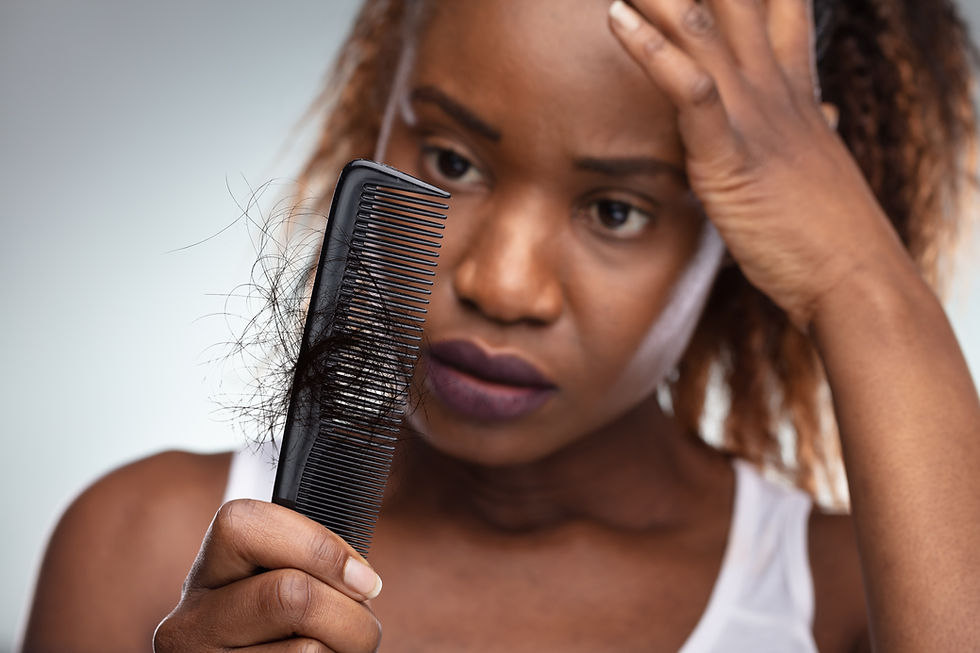Top 7 Reasons Women Lose Their Hair and What You Can Do About It
- Timeless Youth
- Dec 2, 2024
- 4 min read
Updated: Dec 3, 2024
30 million women in the U.S. — most of them in their 40s, 50s, or 60s suffer from hair loss.*
Seeing more strands of hair in the sink than usual? Bunches of it coming out when you comb or wash it? Does your part seem wider than normal? If so, it’s time to take action! Don’t wait to find out why you are losing hair. Below is a list of reasons this might be happening to you and where you can go to get help.
Reason #1: Medications
There are a lot of medications that affect hair growth and loss.
Here are a few:
Anticoagulants or Blood Thinners (ex., Warfarin) are prescribed to prevent blood clots.
Antidepressants and Mood Stabilizers (ex., Lithium) can result in hair loss. However, this resolves itself once the medication is stopped.
Antiretroviral Drugs used by patients with human immunodeficiency virus — aka HIV (ex. indinavir, ritonavir, and lopinavir).
Birth Control: Stopping the combination pill or the progestin-only pill can result in hair loss, which is typically temporary.
Dopaminergic Therapy taken by patients with Parkinson's disease (ex. bromocriptine, cabergoline, levodopa, pergolide, pramipexole and ropinirole.
Thyroid Medication used for hypothyroidism (a deficiency of the thyroid hormone) can cause alopecia. Increasing thyroid hormone levels can initially cause shedding because balancing levels in hypothyroid patients can cause temporary shedding before hair normalizes.
Retinoids: Vitamin A and medications derived from it are often used to treat skin conditions such as acne and psoriasis. However, high dosages can cause alopecia, a disease that happens when the immune system attacks hair follicles and causes hair loss.
Radiation and Chemotherapy: Research shows that radiation dosages above 700 Gray (Gy) destroy the hair follicle and prevent hair from regrowing. Chemotherapy drugs can cause a different type of hair loss called “anagen effluvium,” which is basically an acute injury to the hair follicles.
Reason #2: Stress, Depression, Anxiety
Telogen Effluvium is a common type of hair loss people experience after severe stress or a change in their body. It won’t affect your physical health, but it can affect you psychosocially (how society and social groups affect your thoughts and emotions) and psychologically (how you think about yourself and your behavior). This can lead to emotional stress, anxiety, and depression.
Reason #3: Childbirth
Postpartum hair loss is common. During pregnancy, hormones rise, and blood flow increases. Estrogen, progesterone, and Prolactin are all at elevated levels. These elevations help your hair grow. Once the baby is born, mothers often find themselves shedding hair for up to a year postpartum.
Reason #4: Low In Certain Vitamins
You might be surprised to learn that low levels of certain key vitamins may be the cause of hair loss! Iron and Vitamin D top the list, but being low in Selenium, folic acid, and Vitamin E can lead to more hair loss and less healthy hair production.
Reason #5: Radical Diets
Diets low in calories and protein can cause hair loss. Any diet that throws off the balance of nutrition will always cause havoc to your system. As mentioned above, vitamin deficiency is a leading reason for hair loss, and nothing affects your vitamin and mineral levels more than a poor diet.
Reason #6: Blame Your Mom or Dad!
Family Pattern Hair loss (FPHL) is inherited in the form of baldness, like in male patterns. If your mother or father suffered from hair loss, you may inherit the genes that cause it.
Reason #7: Menopause Could Be the Culprit
Hair loss tends to become more common during menopause. Levels of estrogen drop dramatically around menopause, causing hair follicles to shrink and new strands eventually stop growing. Also, androgens, male hormones that all women have in small amounts, can also contribute to hair loss. Menopause affects the balance between estrogen and androgens, leading to an increase in male hormones. This can cause hair follicles to shrink, producing thinner, more brittle hair and contributing to female pattern baldness. Together, all these hormonal changes can greatly impact the health and vitality of your hair.
Where Can I Get Help?
A primary health specialist is often the right starting point for a woman experiencing hair loss. They are trained to evaluate the patient's health, lifestyle, and medical history. Hair loss can be caused by various factors, including hormonal imbalances, nutritional deficiencies, stress, or underlying health conditions. A primary health specialist can perform initial tests, help identify potential causes, and refer you to the right specialist, such as a dermatologist.
Often, a primary health specialist coordinates care and ensures the patient sees the most relevant specialist, avoiding unnecessary visits and focusing on addressing the underlying issue.
Timeless Youth Empowerment™, led by Dr. Faruqi, supports women over 40 and 50 to take control of their health, vitality, and aging journey. We provide education in hormonal balance, anti-aging strategies, and symptom relief for menopause and midlife changes. We address symptoms like fatigue, weight gain, and sleep issues, helping women regain energy, confidence, and a youthful glow by guiding women through midlife transitions with natural and medical solutions backed by science.
Sources:
Disclaimer: The content in this blog is not intended to be a substitute for professional medical advice, diagnosis, or treatment. Always seek the advice of your physician or other qualified health provider with any questions you may have regarding a medical condition.


Comentarios